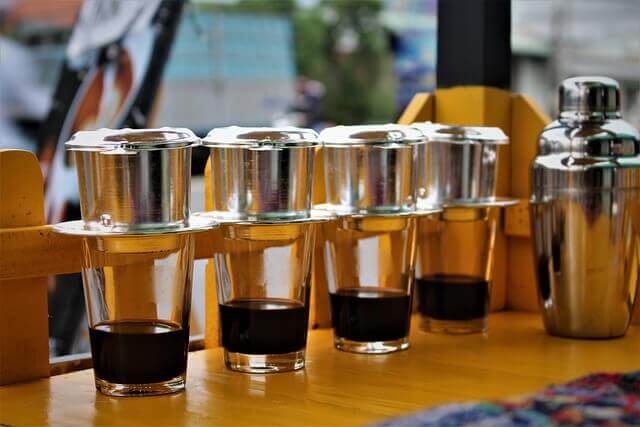A global player in the industry
Whether you’re a coffee connoisseur or just looking for a new caffeine fix, you’re in for a treat. Let’s take a closer look at the rich history and culture of Vietnam’s coffee industry, and how it has become a global player in the world of coffee.
But first, let’s take a quick look at the history of coffee production in Vietnam. Vietnam is currently the world’s second-largest coffee exporter, behind only Brazil. Coffee was first introduced to Vietnam in the 1820s, but it wasn’t until the late 1800s that it began to be grown on a large scale. The industry was initially hampered by the Vietnam War and the country’s political instability, but it has since rebounded and is now one of the fastest-growing coffee producers in the world.
So, what makes Vietnam’s coffee so unique? One of the main factors is the country’s geography and climate. Vietnam’s coffee-growing regions are situated in the Central Highlands, which is ideal for coffee cultivation because of its high elevation, ample rainfall, and warm temperatures, This unique weather conditions give a different flavor profile for the coffee beans and make them unique. Another factor is the types of coffee that are grown in Vietnam. The country is known for producing both Arabica and Robusta coffee, which are the two most popular types of coffee in the world.
The process of coffee production in Vietnam is quite different from that of other countries. Once the coffee beans are harvested, they are first dried in the sun, then transported to a coffee processing facility. At the facility, the beans are cleaned, sorted, and roasted. The final product is a delicious, smooth, and full-bodied coffee that is enjoyed by coffee lovers all over the world.
Special characteristics of Vietnamese coffee:
i. Robusta coffee
Vietnam is one of the largest producers of Robusta coffee in the world, accounting for around 30% of global Robusta production. The coffee is grown primarily in the lowland areas of the country, with the majority of it coming from the provinces of Binh Phuoc, Dong Nai, and Lam Dong. Robusta coffee from Vietnam is known for its strong and robust flavor, with a hint of nuttiness and low acidity, and is famous for its higher caffeine content and a stronger, more bitter flavor than Arabica coffee. The Robusta coffee trees are more resistant to disease and pests than Arabica, therefore it’s easier and cheaper to grow.
It is typically sold as green beans and exported to other countries for roasting and consumption, as well as used as an ingredient in instant coffee blends. Due to its hardiness, it’s quite cheaper than Arabica Many people consider Robusta as a lower-grade coffee in comparison to Arabica, but it has a unique taste and characteristics that many coffee drinkers appreciate.
ii. Arabica coffee
Arabica coffee is a significant part of Vietnam’s coffee production. The coffee is grown in the Central Highlands region of the country, with the majority of it coming from the provinces of Dak Lak and Lam Dong. Arabica coffee from Vietnam is known for its unique flavor profile, which includes notes of chocolate, nuts, and fruit. The crop is typically harvested from November to January and the coffee tree is grown under naturally shaded trees. The Arabica coffee tree is more sensitive and hard to grow than Robusta.
It is typically sold as green beans and exported to other countries for roasting and consumption, though it is also enjoyed locally as well. Due to being labor-intensive, coffee beans are quite expensive.
iii. The Weasel or Civet Coffee
It is a type of coffee that is made from beans that have been eaten by the civet cat, also known as weasel coffee, and then collected from their feces. This process gives the coffee beans a unique and intense flavor that is highly sought-after by coffee enthusiasts.
iv. Sweetened condensed milk
A traditional way of drinking coffee in Vietnam is by adding sweetened condensed milk to the coffee, which gives it a creamy, sweet, and rich taste and texture, which is different than the traditional Western way of having coffee black or with a small amount of cream and sugar.
In recent years, there has been a rise in specialty coffee in Vietnam. This new trend focuses on producing high-quality, single-origin coffees that are grown, harvested, and processed with great care. These specialty coffees are highly sought-after by coffee enthusiasts and have helped to establish Vietnam as a major player in the global coffee market.
Compared with the Western coffee-drinking culture
The traditional and cultural aspect of coffee in Vietnam is also quite different from that of the Western coffee culture. In Vietnam, coffee is often enjoyed at traditional coffee shops, where the art of coffee making is taken very seriously. The art of coffee making is taken very seriously and drinking coffee at these traditional coffee shops is an experience in itself. A traditional method of brewing coffee is to use a small metal drip filter called a “phin” that sits on top of a cup. Ground coffee is placed in the filter and hot water is poured over it, allowing the coffee to drip through into the cup. This method results in a strong, concentrated coffee that is typically enjoyed in black.
In Western culture, coffee is more commonly brewed by a machine and consumed with milk or cream, and a variety of flavors. These traditional coffee shops are a great place to try a cup of Vietnam coffee while soaking up the local culture and atmosphere. Vietnam’s famous coffee culture is also different than the Western style, as it usually uses sweetened condensed milk as an addition to the coffee, this gives a new dimension of sweetness to the coffee that makes it unique.
A common drink that you could not miss
Vietnam’s coffee industry has come a long way in the last few decades. From a small and relatively unknown industry to one of the most important coffee producers in the world. Vietnam’s coffee is characterized by its unique flavor, aroma, and tradition, which makes it one of the most interesting and delicious coffee to try. We hope you’ve enjoyed learning more about Vietnam’s coffee and the rich history and culture behind it. Next time you’re looking for a new coffee experience, we highly recommend giving Vietnam coffee a try!







